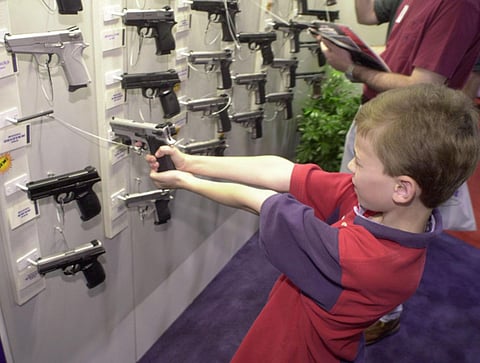Time to say that which must not be mentioned
For the United States, to even think about accepting a gun-free society will take time as well as a cultural shift

Maybe it’s time to start using the words that the National Rifle Association (NRA) in the United States has turned into unmentionables.
Prohibition. Mass buyback. A gun-free society. Let’s say that one again: A gun-free society.
Doesn’t it sound logical? Doesn’t it sound safe? Wouldn’t it make sense to learn from other developed nations, which believe that only the military and law enforcers, when necessary, should be armed — and which as a result lose far, far fewer innocent people than die every year in the US?
Yes, even saying these words makes the NRA happy. It fuels the slippery-slope argument the gun lobby uses to oppose even the most modest, common-sense reforms. You see? Background checks today, confiscation tomorrow.
And yes, I understand how difficult it would be. This is a matter of changing the culture and norms of an entire society. It would take time. But the incremental approach is not succeeding. It sets increasingly modest goals, increasingly polite goals: Close a loophole here, restrict a particularly lethal weapon there. Talk about gun safety and public health. Say “reform,” not “control”. In response, a few states have tightened restrictions, a few states have loosened them. But as a nation — in Congress — America is stuck.
Meanwhile, the strategy of modest reform has its own vulnerabilities. Every time there is a mass shooting, gun-control advocates argue for legislation. But almost every time, opponents can argue that this shooter wouldn’t have been blocked from buying a gun, or that this gun would not have been on anyone’s banned list — and so why waste time (and political capital) on irrelevant restrictions?
To be clear, I believe the NRA is wrong on this, and the Brady Campaign to Prevent Gun Violence is right. Modest restrictions can help and have helped. The one-gun-a-month law can reduce crime. The gun-show loophole should be closed, and closing it would prevent some criminals from obtaining weapons. Every gun in a home with children should have a trigger lock.
But how many members of the Congress will risk their jobs for modest, incremental reform that may or may not show up as a blip on the following year’s murder statistics? We’ve learned the answer to that question.
Fine, you say, but then why would those same members commit political suicide by embracing something bigger?
They won’t, of course. Congress will not lead this change. There has to be a cultural shift. Only then will Congress and the Supreme Court follow.
As we’ve seen over the past 15 years such deep cultural change is difficult — and possible. Wyatt Earp, the frontier mentality, prying my cold dead fingers — I get all that. But Australia was a pioneer nation, too, and gave up its guns. Societies change, populations evolve.
And people are not immune, over time, to reason. Given how guns decimate poor black communities every day — not just when there are mass shootings, but every day — this is a civil rights issue. Given how many small children shoot themselves or their siblings accidentally, it is a family issue. Given the suicides that could be prevented, it is a mental health issue. On average 55 Americans shoot themselves to death every day. Every day.
The Supreme Court, which has misread the Second Amendment in its recent decisions, would have to revisit the issue. If Americans started talking more honestly about the most logical, long-term goal, public opinion would begin to shift. America might end up being a safer country.
There are strong arguments against setting a gun-free society as the goal, but there are 100,000 arguments in favour — that’s how many of us get shot every year. Every year 11,000 Americans are murdered. Every year some 20,000 kill themselves with guns.
Without guns — with only kitchen knives at hand — some of those people would die. Most would still be living. Maybe it’s time to start talking about the most logical way to save their lives.
— Washington Post


